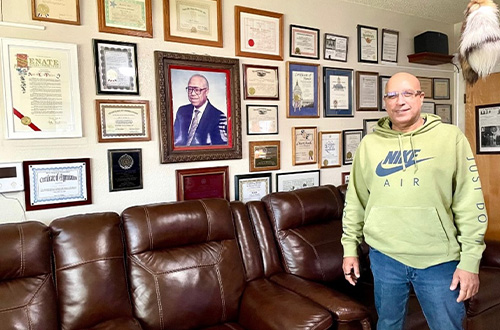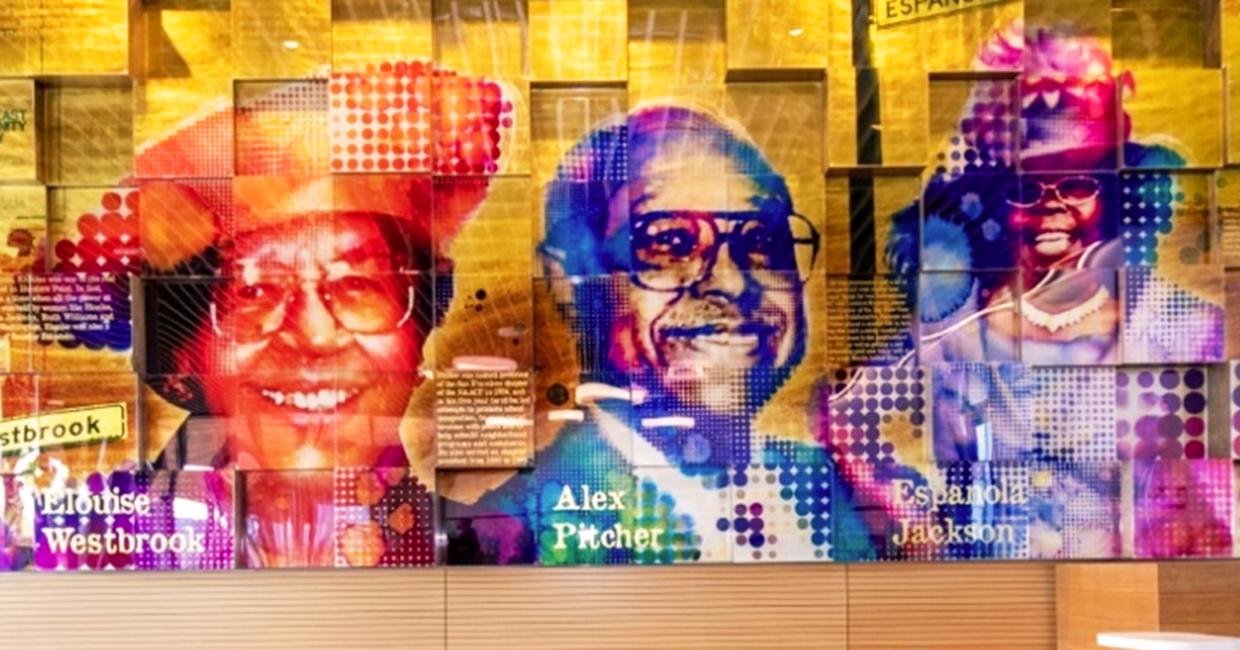When you walk into the new Southeast Community Center, located at 1550 Evans Avenue in the Bayview-Hunters Point neighborhood, it’s tough to miss the larger-than-life portraits that grace the walls.
The portraits honor the legacy of “The Big 6” community activists who led the movement for the original center including: Alex Pitcher, Harold Madison, Ethel Garlington, Dr. Espanola Jackson, Shirley Jones, and Elouise Westbrook.
Across the breezeway is a freestanding sun-filled event space that bears the name of Alex Pitcher. It includes 30-foot-high ceilings and a wall that opens like a garage door to a plaza with amphitheater seating.
Recently, Alex Pitcher’s two children, Barbara Smith and Will Pitcher, took time to share some memories of the fabled Bayview-Hunters Point community leader, who died in 2000.
Remembering Daddy
“Our phone rang constantly, and he was always helping people out,” remembered his daughter Barbara Smith, 72, who now lives in Elk Grove, California. “He was a true community person.” Barbara recalled clearly that her father loved serving the Bayview Hunters-Point community as well as working for organizations such as the Economic Opportunity Council. “He loved working,” said Barbara. “The only reason he stopped, when he was 74, was because he had cancer. Daddy would have been 100 years old this coming September and he’d still be working if he were alive today,” she laughed.

Given their father’s continuous commitment to church and community activities throughout their lives, both Barbara and Will remember his work with the San Francisco Public Utilities Commission (SFPUC) on the community center as one of many meetings, phone calls and events. “Seemed like he was never home. Sometimes he’d come home, eat, and then go out again for another meeting,” laughed Will.
Will Pitcher, 68, was happy to show off the den of his Bayview home, where numerous awards were carefully arranged. Filling the walls were certificates of honor and commendations from an array of organizations that include the San Francisco Board of Supervisors, Southeast Community Center Facility Commission, San Francisco Department of Public Works, San Francisco Chapter of NAACP, and dozens more. Also hung on the wall is a news clipping from Southern University in Baton Rouge, Louisiana, dated April 1951. It lists his father as one of the first graduates of its law school.
Alex and his wife Rosalie moved to San Francisco in 1963.“You want to know what he did when he first got here? He was a cashier at a car wash on 16th and Valencia,” said Will. “He had a law degree, but that’s what he had to do. He got to know everybody, he helped people he met there with his law skills, and he started moving up in the community,” Will added.
Rosalie, 96, was unavailable to be interviewed. She lives with Will, and both he and Barbara care for her. “Mom was a nursing assistant at Kaiser. When she wasn’t working, she went with Daddy everywhere,” recalled Barbara.
Alex Pitcher’s Career and Dedication to His Community
Alex Pitcher was raised in Baton Rouge, Louisiana, where he became one of the first African American lawyers in that state. There he led a movement to fight for the admission of black students into Louisiana State University. In 1950, he escorted the first black student to class and began his career of desegregating public education and promoting equality.
He then began working closely with the NAACP’s head attorney, Thurgood Marshall, on Brown v. Board of Education. It was one of the biggest civil rights cases the U.S. Supreme Court had seen at that point, which ultimately dismantled the “separate but equal” doctrine. Segregation laws were finally ruled unconstitutional, forcing schools to desegregate. Once he moved to San Francisco, Alex became involved in local economic advancement and low-income home-buying programs. He became executive director of the Bayview-Hunters Point Housing Development Corporation and a community consultant for San Francisco’s Department of Public Works’ Clean Water Program.
He also worked as a deacon at Providence Baptist Church, was a member of both the African American Democratic Club and Black Leadership Forum, and an active member of several SFPUC committees. Alex was named president of the San Francisco chapter of the NAACP in 1994.
Working with SFPUC to Build Community Center
Before that, in 1979, Alex worked with a group that would become known as “The Big 6” to advocate for the neighborhood’s right to a community center at 1800 Oakdale Avenue. It was part of an agreement with the SFPUC to offset the impacts of the Southeast Wastewater Treatment Plant on the surrounding communities.
It became clear in 2015, long after he died, that extensive repairs would be needed to the original community center. The SFPUC embarked on a large-scale outreach effort to solicit community feedback on whether the old center should be repaired or a new state-of-the-art center should be built. The results were overwhelmingly in favor of building a new center that would fully live up to the promises of the original agreement for the community.
In 2020, with the help of several local non-profits, the SFPUC engaged in another extensive outreach effort to learn about the programming and amenities community members would like to see at the new center. That information has been used to develop new programs and partnerships to meet the community's needs. The new Southeast Community Center officially opened in 2022.
Read more about the Southeast Community Center here.


